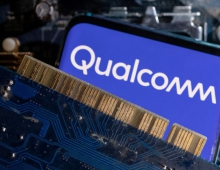
Qualcomm Reports Revenue on Strong Licensing Business
Qualcomm's fourth-quarter revenue and profit were high helped by demand from Chinese smartphone makers and a new licensing model for the company's wireless technology.
Following the loss of its major customer Apple, the smartphone chipmaker did not make any revenue from the release of the new iPhones, which used modems provided from Intel. However, Qualcomm managed to struck deals with Chinese mobile phone makers including Xiaomi, Oppo, Vivo and OnePlus. These Chinese companies are using Qualcomm chips in numerous models that they launch in India.
The company has also eased its licensing requirements, which helped it retain large customers like Samsung Electronics with new license deals.
In the Q4, Qualcomm earned 90 cents per share. Revenue fell to $5.80 billion, but was still above estimates of $5.52 billion.
Qualcomm's loss was $493 million, or 35 cents per share, in the quarter ended Sept. 30, compared with a profit of $168 million, or 11 cents per share, a year earlier.
"We delivered a strong quarter, with Non-GAAP earnings per share above the high end of our prior expectations, on greater than expected chipset demand in QCTand lower operating expenses," said Steve Mollenkopf, CEO of Qualcomm Incorporated. "We are executing well on our strategic objectives, including driving the commercialization of 5G globally in 2019 and returning significant capital to our stockholders."
For Qualcomm’s fiscal first quarter that ends in December, the chip firm forecast revenue of between $4.5 billion and $5.3 billion and adjusted earnings of $1.05 to $1.15 per share. Qualcomm said that about half of Apple’s chip purchases tended to come during the holiday quarter.
"Our guidance has a reduction of over 50 million (chip) units in the quarter, all of that explained by the absence of being in Apple phones" Qualcomm said.
On the profit side, Qualcomm said the adjusted earnings per share guidance of $1.05 to $1.15 included a 45-cent-per-share benefit from a tax restructuring that would not repeat.
Qualcomm is also seeking to settle an antitrust lawsuit brought by the U.S. Federal Trade Commission. That effort suffered a setback this week when a federal judge issued a preliminary ruling saying Qualcomm must license its patents to chip industry rivals such as Intel.
In a conference call with investors, Qualcomm legal chief Don Rosenberg said settlement talks with the FTC are proceeding despite the ruling.





















